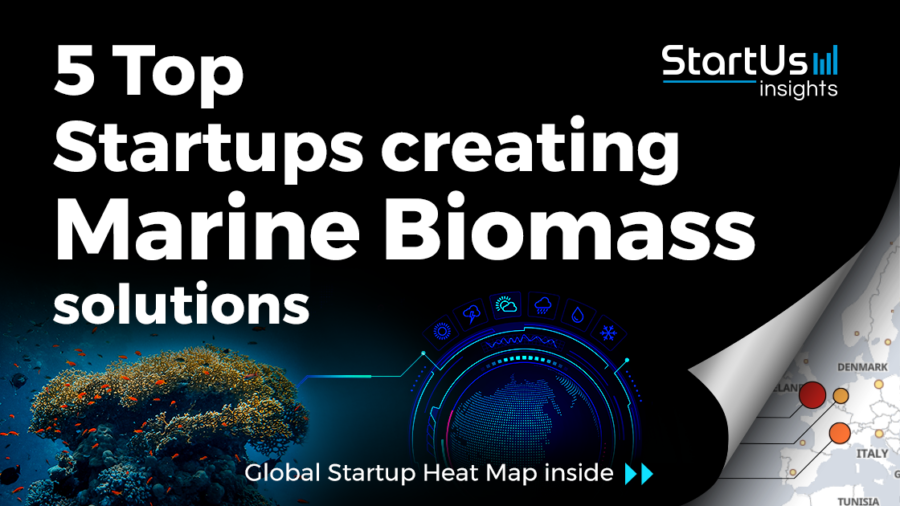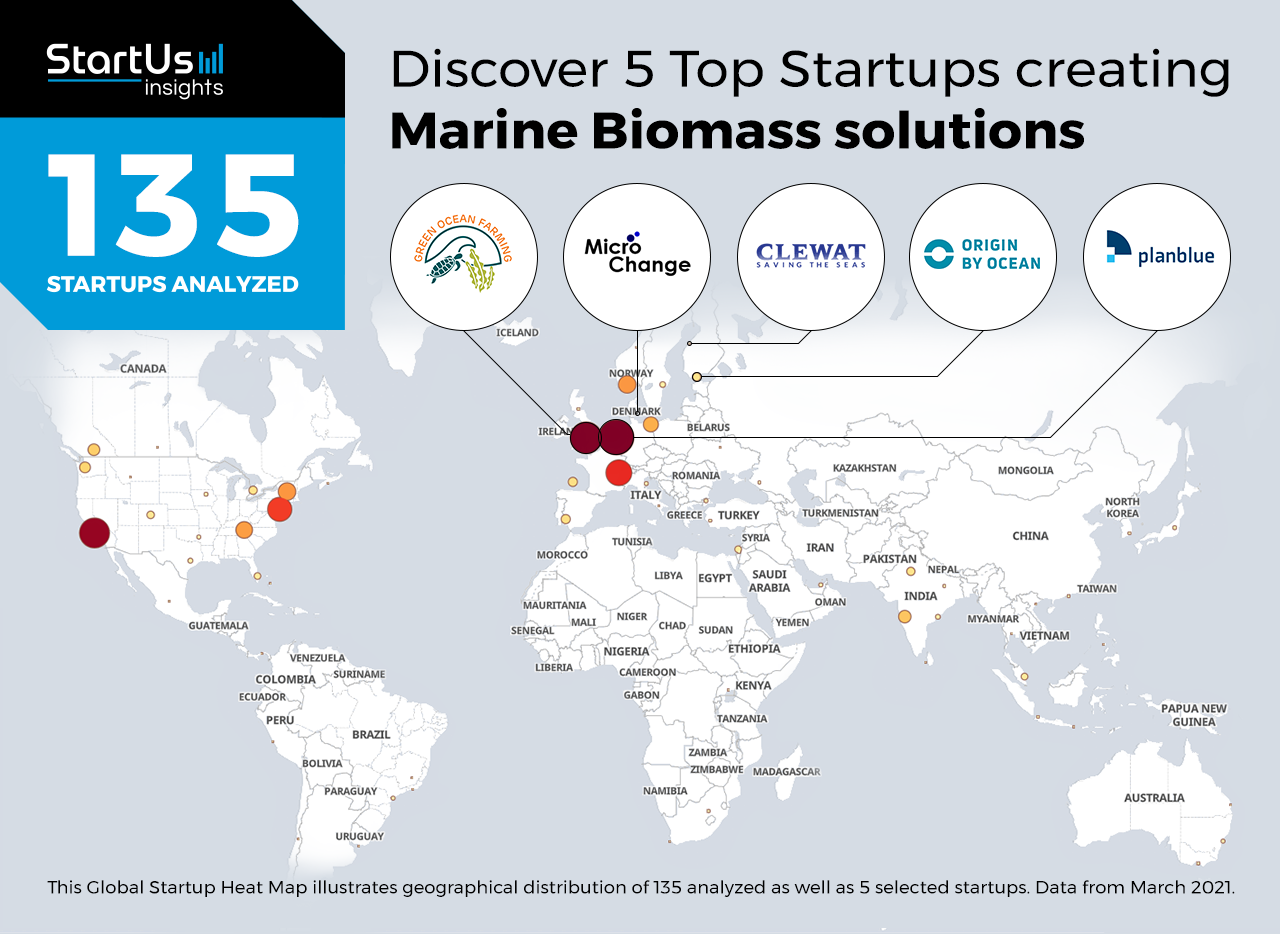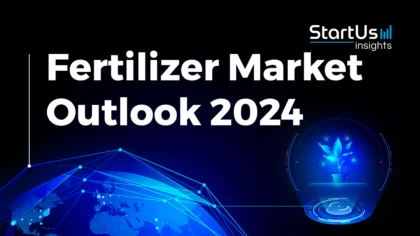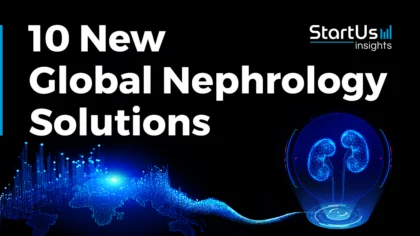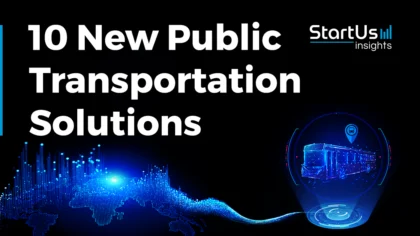Staying ahead of the technology curve means strengthening your competitive advantage. That is why we give you data-driven innovation insights. This time, you get to discover 5 hand-picked startups developing marine biomass solutions.
Global Startup Heat Map highlights 5 Top Marine Biomass Solutions out of 135
The insights of this data-driven analysis are derived from the Big Data & Artificial Intelligence-powered StartUs Insights Discovery Platform, covering 1.379.000+ startups & scaleups globally. The platform gives you an exhaustive overview of emerging technologies & relevant startups within a specific field in just a few clicks.
The Global Startup Heat Map below reveals the distribution of the 135 exemplary startups & scaleups we analyzed for this research. Further, it highlights 5 startups that we hand-picked based on criteria such as founding year, location, funding raised, and more. You get to explore the solutions of these 5 startups & scaleups in this report. For insights on the other 130 marine biomass solutions, get in touch.
Clewat develops Water Cleaning Vessels
Various types of pollutants from plastics, oil spills, and agricultural runoff pose a threat to marine biomass. Microplastics end up inside fish and sea animals, oil kills phytoplankton and breaks down marine food chains, and nutrients from food production decrease oxygen levels in the water. To reduce the impact of human activities on marine biomass, startups develop purification solutions that clean out waste and other types of water pollution.
Finnish startup Clewat develops CleanTech solutions for marine environments. The startup designs and manufactures water cleaning vessels capable of collecting microplastic waste, removing oil from water, and cleaning excess algal biomass. The startup equips booms at the front of their catamaran raft vessels, which collect waste and pollutants and move them using water flow towards the vessel’s conveyor for sorting. In addition to removing harmful substances from water ecosystems, Clewat takes part in marine research, gathering and studying data on plastic pollution.
MicroChange retrofits Ships’ Ballast Water Systems
According to the International Ballast Water Management (BMW) convention, ships are to clean their ballast water from aquatic organisms and pathogens when entering new locations to prevent the spread of invasive species. The conventional ballast water treatment systems usually focus on the end goal of removing pathogens and organisms and often fail to properly handle the substances that enter the filtration system along with the water. In turn, startups develop water treatment systems that are capable of separating ocean biomass from ballast water to further utilize it as fuel.
Danish startup MicroChange develops a ballast water treatment system for filtering out marine biomass and microplastics onboard ships. The startup’s system consists of pumping, filtration, and centrifugal separation units, which extract biomass and microplastics from ballast water. The system enables further utilization of marine biomass as an energy source on the ship and cleans the water of plastic pollutants.
Green Ocean Farming advances Seaweed Farming
Seaweed biomass shows effective results for producing methane and ethanol, and it has the potential to become a major source of biofuel. Moreover, since brown seaweed species, such as kelp, have higher degradation rates compared to green and red seaweed, they are considered the most fitting macroalgal biomass for methanol production. Therefore, to spur the development of sustainable biofuels, startups develop kelp farming solutions.
British startup Green Ocean Farming works on seaweed farming, producing nutrient biomass for human and animal consumption, as well as for packaging and biofuel. The startup leverages the high growth rates of kelp seaweed to maximize biomass production. Aside from its nutritional value and biofuel potential, seaweed agriculture contributes to carbon dioxide removal, forms oxygen as a byproduct, and helps restore coral reefs.
Origin by Ocean works on Biorefinery Processes
Agricultural and industrial runoff contributes to the increasing levels of algae, in particular harmful algal blooms (HAB), in aquatic environments. HABs emit dangerous toxins that impact and even kill the local marine life. To help marine ecosystems, startups develop algal recovery and biorefinery solutions, which allow for further utilization of algal biomass in industries such as pharmacology and cosmetology.
Finnish startup Origin by Ocean works on algal biomass collection and refinery. The startup develops the proprietary Nauvu process which entails the collection and refinery of blue-green algae and bladderwrack seaweed. To scale the process, the startup builds a biorefinery facility for the production of sugars, emulsifiers, pigments, and antioxidants for application in cosmetics, agriculture, and pharmacology, as well as in the food & beverage industry. By removing and processing the excess algae, Origin by Ocean both contributes to marine rejuvenation and develops an algae-based creating an algae-based business ecosystem.
Planblue monitors the Ocean Floor
Since the vast majority of the ocean floor is yet to be explored, scientists lack a complete picture of ocean biomass. Maritime companies use various scanning technologies such as sonar, satellite, and submersibles to map the ocean floor. To help with this, startups develop ocean monitoring solutions for scientific research and inspection.
German startup planblue develops ocean floor monitoring hardware and builds a global seafloor database. The startup uses underwater satellites for ocean and seafloor scanning and mapping. The technology combines hyperspectral and RGB imaging with underwater navigation and processes the data with AI. Planblue’s solutions give scientists a better understanding of ocean biomass and biodiversity, as well as helping them uncover the threats to marine ecosystems.
Discover more Startups
Startups such as the examples highlighted in this report focus on artificial intelligence, the internet of things, sensors, as well as smart devices. While all of these technologies play a major role, they only represent the tip of the iceberg. To explore more technologies, simply get in touch to let us look into your areas of interest. For a more general overview, you can download our free Industry Innovation Reports to save your time and improve strategic decision-making.
